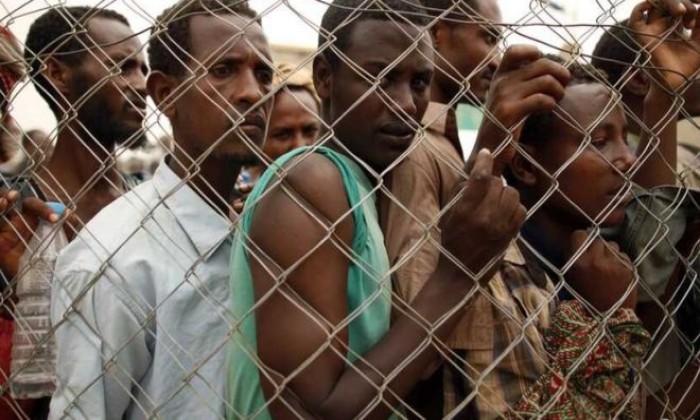The Gulf remains a major destination for migrant workers, primarily from southern and Southeast Asia. Often, migrants from Bangladesh, India, Sri Lanka, Pakistan, and numerous other countries travel to the Gulf States to work in low-skilled labour sectors. ADHRB, along with other organisations, reported the systemic discrimination these minorities face, including access to healthcare, threats of withholding of passports, physical or verbal abuse or non-payment of wages. Nonetheless, one of the most persistent and concerning discrimination is the disproportionality when it comes to the death penalty. The number of migrants who are killed by judicial execution is grossly disproportional to the size of the population living in the GCC. ADHRB recognises that this disproportionality lies in multiple factors, rendering the migrant workers an exceptionally vulnerable community.
The vulnerability of this community depends on being subject to power imbalance and often exploitation. ADHRB acknowledges that this condition affects them before and after arriving in the Gulf, causing disproportionality in sentencing to be an issue of a larger scope. Usually, migrant workers come from rural areas, have limited literacy and become dependent on migrant brokers in their original countries. These figures often manipulate migrant workers, tricking them into smuggling drugs into the Gulf, with the highest percentage coming from Pakistan. This founding issue, combined with the flaws of the GCC judicial systems, socioeconomic disadvantage, language barriers and discrimination, cause immigrants to be the primary victims of sentencing and death penalties.
In Bahrain, despite rhetoric of reform, death sentences in the last decade rose by over 600%. The data gathered between 2011 and 2021 shows a clear pattern of discrimination against foreign nationals in the context of the death penalty. Mainly, Bangladeshi nationals are disproportionately represented in this category. In addition, Reprieve informs that in contrast to Bahraini nationals, no pardons or commutations were offered to Bangladeshi nationals. In these circumstances, the decision of 2018 to allow death sentences for non-lethal charges (drug offences) represents a noteworthy backwards move for human rights in the country.
Moving to Saudi Arabia, the situation is even more concerning, considering that it has the third-largest migrant population in the world. Generally, foreign nationals are particularly vulnerable to due process and fair trial violations when it comes to the death penalty. The UN Committee on the Elimination of Racial Discrimination raised this point about a disproportionate number of foreign nationals facing the penalty in Saudi Arabia. From 2010 to 2021, Saudi Arabia has executed a total of 490 foreign nationals, with some nationalities overrepresenting their proportional representation in the total population. In particular, Pakistani nationals, making up 5% of the total population, represent 13.19% of the total number of executions. Furthermore, their sentence is flawed by a criminal justice system discrimination characterised by denied access to interpretation, legal representation or consular assistance.
To conclude, the disproportionality in sentences against foreign nationals represents an issue that needs to be tackled at the national and transnational levels because of its characteristics. Many of the circumstances by which the death penalties were handed are related to the abusive functioning of the kafala system, exacerbated by a total lack of consular support from sending states. There is a significant correlation between citizenship and low class that causes migrant workers to be victims of exploitation. For this reason, ADHRB deems that both sending states and Gulf ones must take measures to stop the abuse against migrant workers, ultimately exemplified in the disproportionate sentencing against them.
Recommendations for sending states:
- Ratify the International Convention on the Protection of Rights of All Migrant Workers and Members of Their Families.
- Intensify the efficiency of consular offices for representing nationals working abroad.
- Initiate diplomatic exchanges with Arab countries to find countermeasures against human trafficking (including new treaties).
- Protect the nationals, especially the ones coming from lower classes, who are subject to human trafficking.
Recommendation for Bahrain and Saudi Arabia:
- Ratify the International Convention on the Protection of Rights of All Migrant Workers and Members of Their Families.
- Abolish the Kafala system, which, through its sponsorship system, causes migrant workers to be subject to human trafficking.
- Cease using the death penalty arbitrarily.
- Improve the quality of the trial, including legal representation, language barrier, and assumption of innocence.
- Provide adequate socio-economic measures to ensure foreign workers can afford legal representation or pay blood money.
- End the discrimination against foreign nationals in the application of the laws.
- Publish a moratorium for abolishing death sentences for drug-related crimes, which enhances the risks for migrant workers who are victims of human trafficking.
- Respect the pronouncing in different international law cases to ensure enhanced due process and fair trial rights for foreign nationals (recognising the range of barriers they face in the criminal system).





